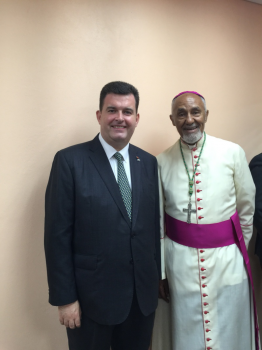The Commonwealth is not waiting with open arms for Brexit Britain

Sir Anthony Bailey in Antigua and Barbuda together with Archbishop Donald Reeves of Kingston, Jamaica
A common refrain from many of those campaigning for Britain to leave the European Union is that Britain has no need for the EU when it has the Commonwealth.
For these campaigners, the EU embodies an apparently arbitrary group of states with widely differing histories, cultures and legal systems. The Commonwealth - the group of 53 independent states largely coterminous with the former British Empire - represents the diametric opposite: a body of like-minded nations with common political systems and heritage, and growing economies, which offers Britain a vast network in which to expand and deepen its economic, political and cultural engagement.
Proponents of this so-called 'Commonwealth option' range from those advocating post-Brexit free trade agreements with countries such as Canada, Australia and India, or freedom of movement across some of the richer member states, to those calling for a form of Commonwealth-level political union or free trade area.
While such a position on the pro-Leave side certainly refutes any portrayal of its advocates as 'Little Englanders', it does suggest that Britain is still grieving the end of empire while refusing on some level to accept that it is even lost. But any idea that the Commonwealth somehow represents an extension of Britain, or even a natural vehicle for British power, usually meets strong opposition in the Commonwealth itself and rightly so. In the whole referendum battle not one Commonwealth member - from India to tiny Tuvalu - has come out in favour of Brexit.
The strange thing is that, whilst the Commonwealth urges Britain to lead, not leave, Europe, member governments want Britain to take a stronger role in the Commonwealth organization. The key question is whether leaving the EU would help, hinder or in fact not affect these hopes. Brexit could in fact prove significantly detrimental to elements of the Commonwealth.
It is time for voters to understand that the Commonwealth wants Britain to be leading not leaving the European Union. The Commonwealth wants closer trading, political and security links with Europe. Today 80% of the Commonwealth have, or are seeking, free trade deals with the 500 million consumers of the EU. They want Britain in to help them, not out to thwart them.
The world has changed dramatically since the 1960s and trade and foreign-policy relationships are both regional and global, transcending a group such as the Commonwealth, with its vast disparity of wealth, populations and national interests. There is no need to choose between the Commonwealth and EU because they are profoundly different organizations with different objectives.
Far from Brexit presenting the UK with an opportunity to reconnect or grow closer to the Commonwealth, in the case of Cyprus and Malta, Britain stands to lose friendship and influence among two of its closest EU partners, and in fact pull Commonwealth members further apart.
Brexit could cause chaos in the areas that its advocates profess to care most about. The British Overseas territories such as Gibraltar and the Falkland Islands could face disastrous consequences both economically and constitutionally if their needs are not met by the British Government during Brexit negotiations.
After Brexit, Britain's voice would be smaller, and could not command the loyalty of the Commonwealth in any putative competition with the EU. The UK could similarly no longer harness the strength and clout of the EU to deliver its own agenda on development and human rights. The EU would still influence the Commonwealth on these issues, but without Britain's input.
The prospect of any bilateral FTAs between a post-Brexit UK and Commonwealth countries is remote in the short and even medium term. The fact that Germany is so often a more important EU trading partner for Commonwealth countries than the UK, demonstrates the Brexit fallacy of a Commonwealth waiting to throw in its lot with Britain.
Dreams of restoring the Empire are not only delusions but deeply dangerous to our continuing relations with our oldest friends. Far from uniting the Commonwealth family, Brexit could damage it - as countries choose practical economic necessity over a sentimentality shared only by those who are nostalgic rather than realistic.
Read the full report here: www.anthonybailey.org/brexit-commonwealth-dimension-new-report-published-british-influence-anthony-bailey-consulting/





















